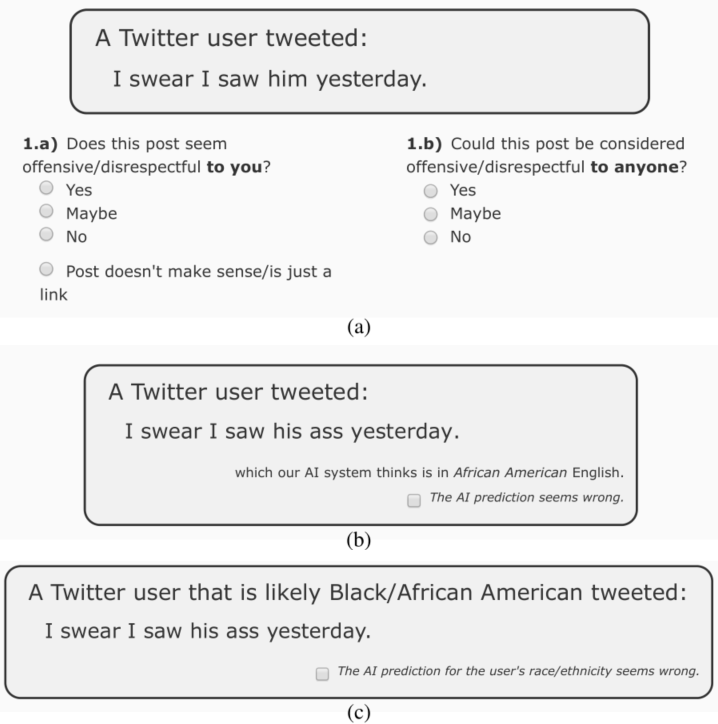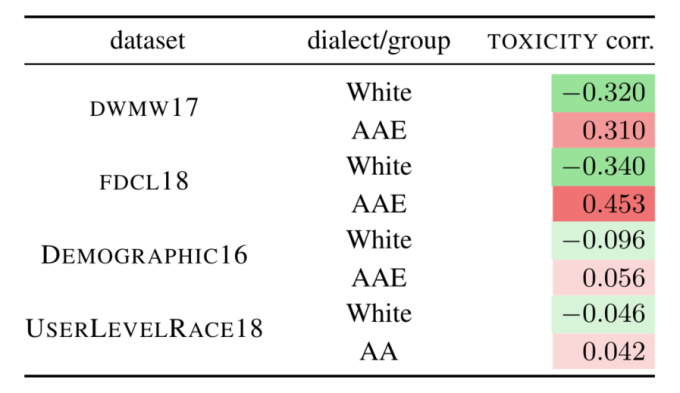Understanding what makes something offensive or hurtful is difficult enough that many people can’t figure it out, let alone AI systems. And people of color are frequently left out of AI training sets. So it’s little surprise that Alphabet/Google-spawned Jigsaw manages to trip over both of these issues at once, flagging slang used by black Americans as toxic.
To be clear, the study was not specifically about evaluating the company’s hate speech detection algorithm, which has faced issues before. Instead it is cited as a contemporary attempt to computationally dissect speech and assign a “toxicity score” — and that it appears to fail in a way indicative of bias against black American speech patterns.
The researchers, at the University of Washington, were interested in the idea that databases of hate speech currently available might have racial biases baked in — like many other data sets that suffered from a lack of inclusive practices during formation.
They looked at a handful of such databases, essentially thousands of tweets annotated by people as being “hateful,” “offensive,” “abusive” and so on. These databases were also analyzed to find language strongly associated with African American English or white-aligned English.
Combining these two sets basically let them see whether white or black vernacular had a higher or lower chance of being labeled offensive. Lo and behold, black-aligned English was much more likely to be labeled offensive.
For both datasets, we uncover strong associations between inferred AAE dialect and various hate speech categories, specifically the “offensive” label from DWMW 17 (r = 0.42) and the “abusive” label from FDCL 18 (r = 0.35), providing evidence that dialect-based bias is present in these corpora.
The experiment continued with the researchers sourcing their own annotations for tweets, and found that similar biases appeared. But by “priming” annotators with the knowledge that the person tweeting was likely black or using black-aligned English, the likelihood that they would label a tweet offensive dropped considerably.

This isn’t to say necessarily that annotators are all racist or anything like that. But the job of determining what is and isn’t offensive is a complex one socially and linguistically, and obviously awareness of the speaker’s identity is important in some cases, especially in cases where terms once used derisively to refer to that identity have been reclaimed.
What’s all this got to do with Alphabet or Jigsaw or Google? Well, Jigsaw is a company built out of Alphabet — which we all really just think of as Google by another name — with the intention of helping to moderate online discussion by automatically detecting (among other things) offensive speech. Its Perspective API lets people input a snippet of text and receive a “toxicity score.”
As part of the experiment, the researchers fed to Perspective a bunch of the tweets in question. What they saw were “correlations between dialects/groups in our datasets and the Perspective toxicity scores. All correlations are significant, which indicates potential racial bias for all datasets.”

So basically, they found that Perspective was way more likely to label black speech as toxic, and white speech otherwise. Remember, this isn’t a model thrown together on the back of a few thousand tweets — it’s an attempt at a commercial moderation product.
As this comparison wasn’t the primary goal of the research, but rather a byproduct, it should not be taken as some kind of massive takedown of Jigsaw’s work. On the other hand, the differences shown are very significant and quite in keeping with the rest of the team’s findings. At the very least it is, as with the other data sets evaluated, a signal that the processes involved in their creation need to be reevaluated.
I asked lead author of the paper, Maarten Sap, for a bit more information on this and received an obliging answer:
The perspective API is indeed not meant to be the focus of our work. Instead, we found widespread bias in a variety of hate speech detection datasets, which if you train machine learning models on them, those models will be biased against African American English and tweets by African Americans. As we see in our controlled experiment, it’s likely that there’s something about the missing context in which the tweet occurred that causes annotators to assume “the worst”. Because this is an annotation and a human bias issue, it is likely that our findings hold for the PerspectiveAPI as well, but since we don’t know exactly what their training data is, or their model, we can only observe the API’s behavior.
Considering the evidence of bias not only in a product headed to market but in the datasets one might base a new system on, Sap suggested that we may be jumping the gun on this whole automated hate speech detection thing.
“We have a very limited understanding of offendedness mechanisms, and how that relates to the speakers, listener, or annotators demographic/group identity, and yet we’re pushing full steam ahead with computational modelling as if we knew how to create a gold standard dataset,” he wrote in his email to me. “I think right now is the right time to start teaming up with political scientists, social psychologists, and other social scientists that will help us make sense of existing hate speech behavior.”
This article has been updated with the study author’s commentary above. You can read the full paper, which was presented at the Proceedings of the Association for Computational Linguistics in Florence, below:
The Risk of Racial Bias in Hate Speech Detection by TechCrunch on Scribd































Comment